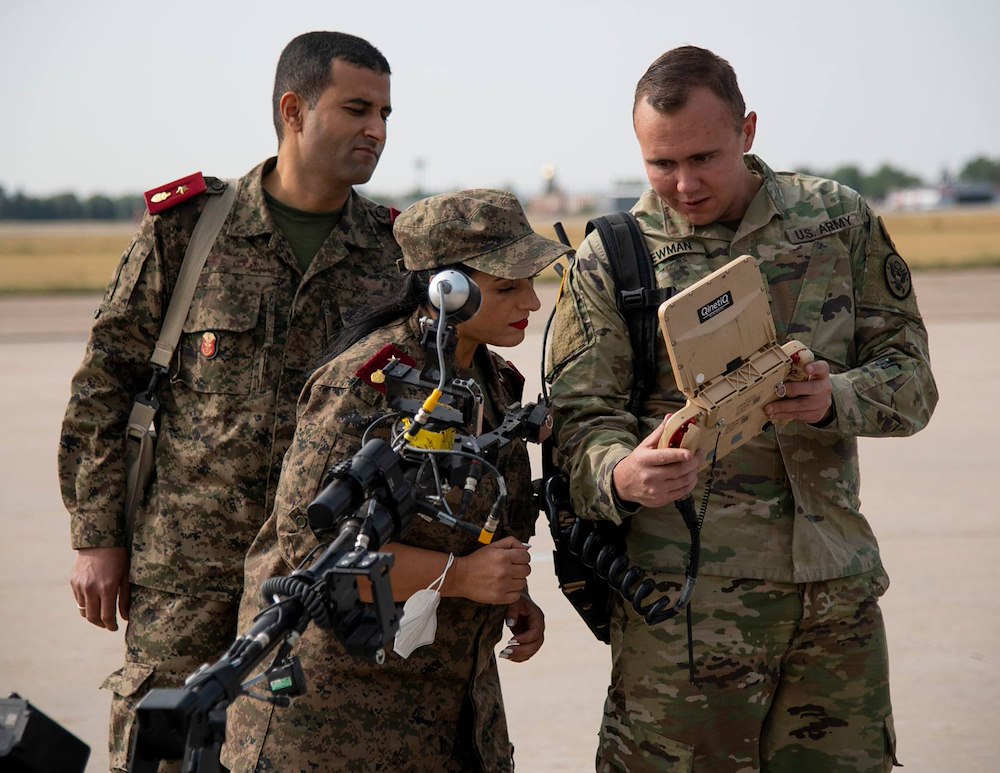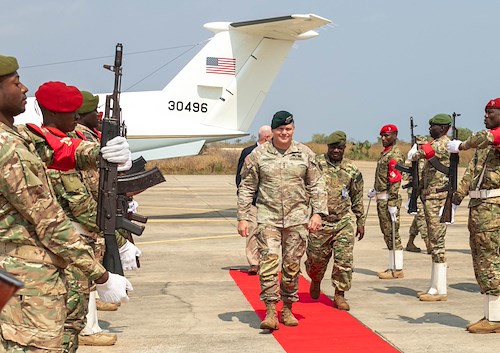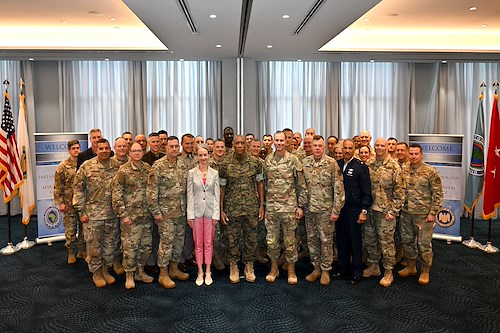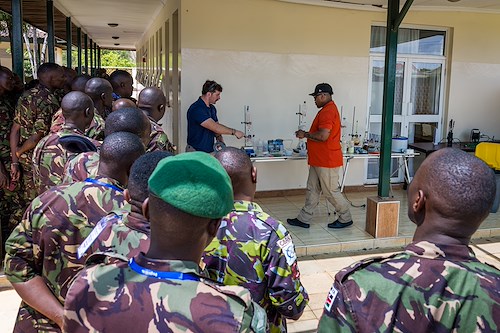State Partnership Program
The State Partnership Program is a key U.S. security cooperation tool that facilitates cooperation across all aspects of international civil-military affairs and encourages people-to-people ties at the state level.
 Managed by the Chief of the National Guard Bureau, the program is executed by geographic combatant commands and sourced from the 54 U.S. states, territories, and the District of Columbia.
Managed by the Chief of the National Guard Bureau, the program is executed by geographic combatant commands and sourced from the 54 U.S. states, territories, and the District of Columbia.Since its inception in 1993 with the three Baltic Republics, the program has grown to encompass over 100 partnerships worldwide. Currently, there are 20 State Partnerships between U.S. states and African nations, reflecting the program’s mission to build enduring relationships that enhance global security, mutual understanding, and cooperation.
The SPP supports Department of Defense objectives and theater campaign plans by fostering long-term connections across all levels of society. These partnerships promote economic, political, and military ties while addressing regional and global security challenges. Over the past five years, these partnerships in Africa have included hundreds of events, involving thousands of personnel, to achieve security cooperation goals.
State Partnerships in Africa
Here are the current partnerships between U.S. states and African nations, along with their year of establishment:
Benin, Ghana, Togo | North Dakota National Guard (2004, 2014)
Botswana, Malawi, Zambia | North Carolina National Guard (2008, 2024, 2024)
Burkina Faso | District of Columbia National Guard (2018)
Cabo Verde | New Hampshire National Guard (2021)
Djibouti | Kentucky National Guard (2015)
Gabon | West Virginia National Guard (2024)
Kenya | Massachusetts National Guard (2015)
Liberia, Sierra Leone | Michigan National Guard (2009, 2024)
Morocco | Utah National Guard (2003)
Niger | Indiana National Guard (2017)
Nigeria | California National Guard (2006)
Rwanda | Nebraska National Guard (2019)
Senegal | Vermont National Guard (2008)
South Africa | New York National Guard (2003)
Tunisia | Wyoming National Guard (2004)
Partnership Highlights
Benin, Ghana, and Togo | North Dakota National Guard
North Dakota’s partnership with Ghana began in 2004 and expanded to include Benin and Togo in 2014. These collaborations emphasize regional cooperation, economic development, and interoperability through military and civilian engagements.
Botswana, Malawi, and Zambia | North Carolina National Guard
The partnership with Botswana, established in 2008, focuses on special forces development, disaster response, and peacekeeping operations. In 2023, this relationship expanded to include Malawi and Zambia, prioritizing comprehensive collaborations in emergency management, leadership development, and counter-terrorism efforts.
Burkina Faso | District of Columbia National Guard
Since 2018, the D.C. National Guard has partnered with Burkina Faso to foster mutual security and cultural understanding. This collaboration has strengthened regional security and human capital investment through joint training and leadership exchanges.
Cabo Verde | New Hampshire National Guard
Established in 2021, this partnership supports military and civilian efforts, including health care, education, and disaster preparedness.
Djibouti | Kentucky National Guard
The partnership with Djibouti began in 2015, focusing on interoperability, disaster management, and professional development through regular exchanges and cooperative training.
Gabon | West Virginia National Guard
Initiated in 2024, this partnership enhances military cooperation, disaster response, and regional stability, leveraging West Virginia’s expertise in civil engineering and defense readiness.
Liberia and Sierra Leone | Michigan National Guard
Michigan’s partnership with Liberia began in 2009, emphasizing disaster response, peacekeeping, and military education. In 2024, Sierra Leone joined this partnership to bolster regional security and stability.
Morocco | Utah National Guard
Since 2003, Utah and Morocco have collaborated on over 100 engagements, including aviation, cybersecurity, and humanitarian assistance. These efforts aim to enhance Morocco’s role as a regional security leader.
Nigeria | California National Guard
Established in 2006, this partnership focuses on emergency management, peacekeeping operations, and improving security procedures and human rights practices.
Senegal | Vermont National Guard
The Vermont-Senegal partnership, active since 2008, has led to significant advancements in medical training, humanitarian mine action, and infrastructure development.
South Africa | New York National Guard
Since 2003, New York has worked with South Africa on military and civilian exchanges, emphasizing peacekeeping, disaster response, and joint training initiatives.
Tunisia | Wyoming National Guard
Wyoming’s partnership with Tunisia, established in 2004, focuses on aviation, medical evacuation, and leadership development. The partnership includes academic exchanges facilitated by the University of Wyoming.
The State Partnership Program exemplifies a robust and cost-effective approach to enhancing global security and fostering enduring partnerships. By connecting U.S. states with African nations, the program builds a foundation for shared success, addressing global challenges through mutual collaboration.
To learn more, click here to see the National Guard Bureau's information about the State Partnership Program.




